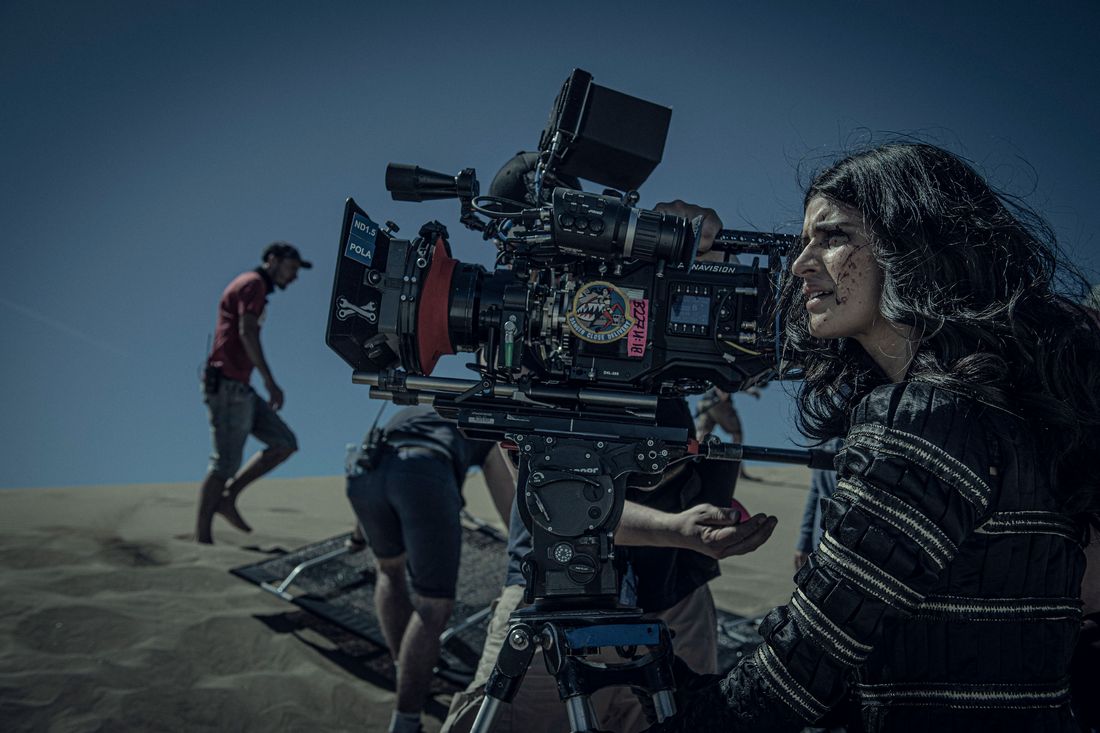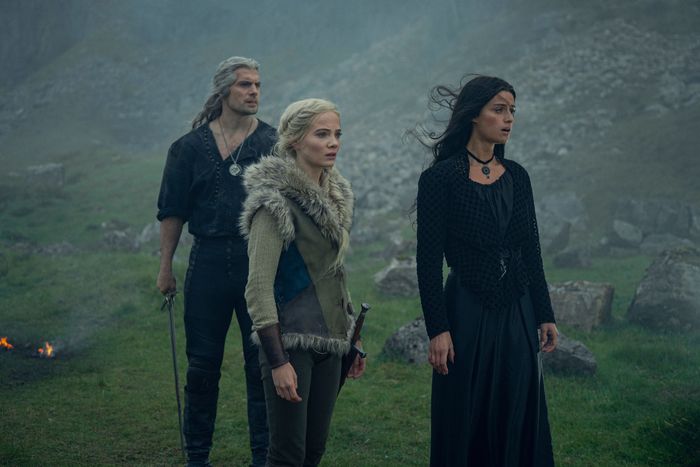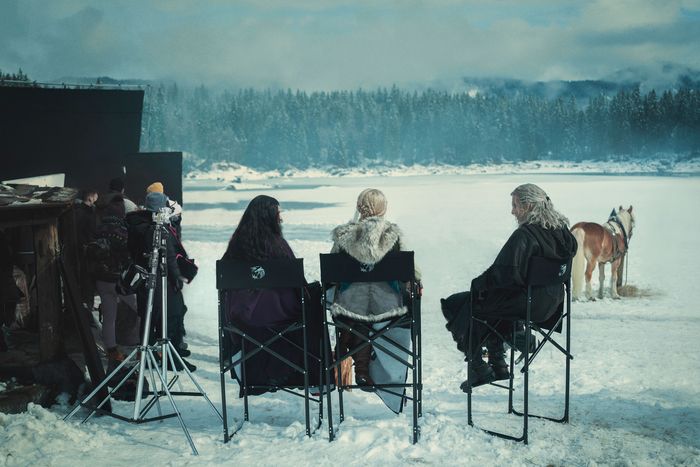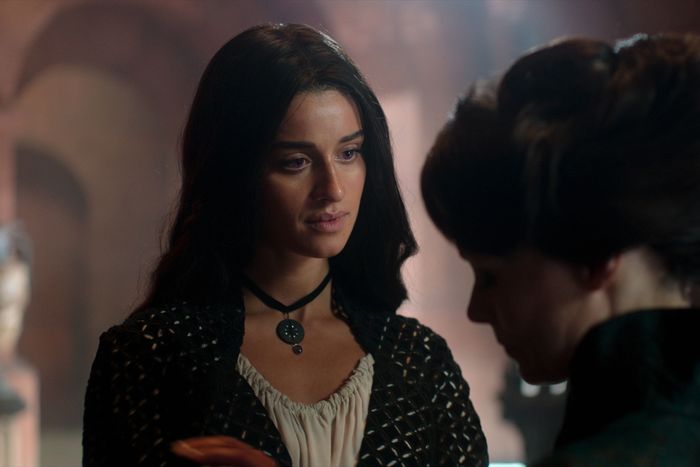
Spoilers follow for the third season of The Witcher, which premiered its final three episodes on Netflix July 27, as well as Baptism of Fire, the Witcher Saga book that has yet to be adapted to series.
After three seasons of The Witcher, actress Anya Chalotra speaks of her character, Yennefer of Vengerberg, with a musing fondness. Chalotra was cast nearly five years ago in the Netflix adaptation of Andrzej Sapkowski’s Witcher Saga as a clever, forceful, and secretly softhearted sorceress who has relinquished nearly everything, including her youth and fertility, for beauty and the power to manipulate the earth’s elements via chaos magic. A testament to Chalotra’s magnetism in the role, the sorceress’s inner life — what she wants for herself, the bonds she forms with other women and her former lover, the titular Witcher Geralt (Henry Cavill), and what future she hopes to mold for their adoptive daughter Ciri (Freya Allan) — forms the new season’s narrative fulcrum.
As the Continent descends into war and various factions hunt for the prophesied Ciri, Yennefer fully devotes herself to teaching the young woman how to control her magical abilities, and they and Geralt fall into a cozy familial relationship that belies the approaching danger. Chalotra lets Yennefer’s guard fall away. She’s mature but playful, canny and vulnerable, and her connection to both Cavill and Allan feels lived-in and real. The trio is separated at the end of finale “The Cost of Chaos,” yet new chapters await Yennefer, both as Ciri’s mother figure and as a leader for the sorceresses displaced by the destruction of their training academy, Aretuza. “I was excited to get to a point in Yennefer’s life where it’s not all about her,” Chalotra says. “For the first time, she figures out what her true purpose is.”
There are so many special effects in this show, so much lore, so many locations. Do you have a process for breaking down scripts or organizing your arc?
With The Witcher, which has been my main body of work since 2018, I read the script again and again and again, as much as possible, so I know where I’ve been and where I’m going. I go back to all the quotes I’ve pulled from the book that really mean a lot to me. I’ve also learned that on the day, everything changes. You are not in control of anything. The scene you thought you knew, the truth you thought you’d be able to bring — it’s completely different for the person you’re working opposite. You have to be prepared to be open. You have to be prepared to look into the other actor’s eyes knowing that they want to go a different direction, and if you’ve got two people and a director involved, a writer also involved — if you’re stubborn and insist a scene has to be played a certain way, nothing is going to work. I’ve got to do enough prep to be freer to play.
Was there a scene this season that had that tension?
A lot of the scenes with Freya, actually. We were wondering how we were going to come back from the betrayal at the end of season two. This very, very clever young girl has learned to trust nobody. Why would she trust Yennefer? Why would she lean on her to be a mother figure, let alone a teacher? And we realized that through teaching, she could become more maternal. Through this imperfect version of a mother that Yennefer embodied, Ciri would see that she can connect with a human being and forgive faults. Yennefer really brings her into her world, and she doesn’t bring many people in. It was a difficult road to go on because we had a limited amount of time to do it. There were different extremes of each scene that we could play, and we had to work together to find this strength of relationship quickly.
Are there any elements from your life, memories of what it felt like to be a child or ideas about what motherhood means to you as an adult, that shaped Yennefer’s relationship to Ciri?
In my post-formative years, my 20s, I have learned a lot from my relationship with my mom, my sister, my aunties, my younger siblings. My brother, for instance, educates me a lot. He’s quite responsible for a lot of things, and he’s younger than me. It’s not about age — Yennefer is like 100 years old. No matter where you are in your life, you can still feel helpless or lost or as curious as you were when you were a child. I had to bring that to Yennefer’s understanding of becoming a mother because she didn’t have much to draw on. She had this dysfunctional relationship with Tissaia, with the mother who disowned her, with men, with the structure of the Brotherhood that took something so important away from her.
I laughed when she says to Ciri during training, “I’m not angry, I’m disappointed.” Everyone knows what it feels like to hear that.
One hundred percent. And Yennefer follows with, “You didn’t think about the consequences.” My dad has forever — as long as I can remember — said [emphasizing each word with her hands], “You’ve got to think about the consequences, the consequences of your actions.” I watched that episode with my dad, and I looked over to him like, “Does this remind you of anyone?” My family and I were playing a game and the prompt was, “What would the title of Dad’s memoir be?” We all wrote, “You’ve gotta think about the consequences.” That’s how important that is to me.
Before we learn that Yennefer’s mentor Tissaia takes her own life, the two have a final conversation about what they’ve given up because of chaos and reflect on their relationship built on shared pain. Can you talk about filming that last scene with MyAnna Buring?
I knew we were coming to that. This was the most important part of season three for me: this relationship and it coming to an end as it does. In that ending, Yennefer is fully able to step into a position of responsibility. She’s always relied on Tissaia. That’s been her beacon, her guiding light for so long, and now she has to travel in those footsteps and own all the life lessons Tissaia taught her.
MyAnna means so much to me. She was there day one. I’d spend time with her family in Budapest. She looked after me in season one, and has through the seasons — not only me, but everyone on set. She gives so much. That loss is huge for the show and huge for Yennefer.
I think the show has, through Aretuza and these women, this very strong thematic core about female life — about empowerment, about choice, about sacrifice. These women work together, although they don’t really like each other all the time. And Yennefer absorbs these relationships after Tissaia’s death.
I agree. Only when Tissaia goes can Yennefer accept responsibility. She’s always caused chaos — complete chaos — because there’s always been someone else to pick up the pieces. She’s known that there’s someone else in this world who will be there for her. When she’s with Geralt in that final scene, what does she say? “I need you to say that you’ll still be with me, you’ll still be there.” That means a lot because Tissaia’s gone. Who has Yennefer got now? Being alone with a child, and having to live for her — that’s scary enough, because it costs so much. Can she do it?
The premiere begins with the “Your friend, Yennefer,” letters, which Yennefer sends to Geralt as they try to rebuild their relationship after the strife of season two and become a little family with Ciri. Your reading of these letters becomes the narration of the season. I know you’ve done some voice acting. What was that experience like?
I love those letters. I remember reading the books thinking, I can’t wait for that moment to come in our show. They’re full of wit. You get to see the real Yennefer, the Yennefer everyone loves. It was lovely to be able to speak them. I enjoy voice work a lot, I lose myself completely. I don’t care about what I look like or what’s onscreen. You’re not working with the camera or anyone else — you’re by yourself in this little room. You have to be as specific, if not more, in voice work versus when you’re acting in film. You can hear everything in your voice, whether a specific letter, phrase, or thought lands because you get it played back to you straight away. Then you can perfect that.


The ball at Aretuza is so much fun. It has almost a Great Gatsby–ish Art Deco style, and the Rashomon approach with differing timelines and perspectives show how much Yennefer has evolved in terms of how she treats Geralt and the other members of the Brotherhood. What was it like being on set for that?
When we’re all together, the room just comes alive, so I knew it was going to be a brilliant episode to shoot. The structure of the whole thing was exciting: “How are we gonna make this work? What are you wearing?” Yennefer was in her element — I was in my element playing this scene. I was very nervous, because a lot of it weighed on Yennefer’s scheming and plotting. It was hard standing in heels. The wig was very heavy. The dress was beaded and extremely heavy. But that all added to it. I love heavy costumes or things I can work with to find the weight of the scene. There’s a sense of composure and confidence that Yennefer needed that I don’t naturally have, or find it difficult to find, even as an actor. I was glad that I did, and I was happy watching that back.
When war erupts after the ball, Yennefer and Ciri are being chased by the fire mage Rience. You face him with Geralt’s sword, and then you throw it — and the camera moves so we see Geralt standing behind Rience. He catches the sword you threw and decapitates Rience. Are you doing that throw yourself? Do you enjoy stunt work?
I love stunt work. I love working with my body to make something. I’ve always wanted to do more of it. This season, we were more specific because we wanted to bring Yennefer’s magic to life a bit more, and I basically just wanted to hang out with the stunt department. They’re so fun, and Wolfie [supervising stunt coordinator Wolfgang Stegemann] is just adored. This season wouldn’t be the same without him.
How was the throw executed?
I throw it, it lands on the floor. Thank goodness the camera turns away from my face, because I’m like, Oh, that was embarrassing. And then someone throws it to Henry fast, and fortunately, it looks cool. I do have to trust a lot of people, because in that moment, when I go [pantomimes throwing it], and it just falls flat on the floor, there’s nothing worse. There’s nothing more humiliating. And my face is so determined!
Yennefer’s movements when she’s doing magic incorporated Indian dance this season. Did that idea come from you?
The stunt team came to me to ask. They wanted to elevate Yennefer’s magic, and they first thought of Indian dance, kathak. Of course, I jumped at the opportunity. I’m culturally very familiar with it. I grew up on Bollywood films. If we’re gonna elevate magic, why not use something I’m familiar with, especially when it’s all about hand gestures? I didn’t want it to be about Indian dance moves — it’s Polish folklore, it’s Polish novels, it’s a Polish world, we didn’t want it to be a thing — but enough of a moment that people are like, “Wow, I’ve not seen that before.”
You’ve previously said that Yennefer’s fearlessness is what you relate to most. Is that still the case?
I’m definitely fearful of many things. I suppose I meant resilience. Everything Yennefer’s been put through, I feel like I’ve been put through. I’m always searching for something more complex. She’s constantly saying “I want everything” — she screams, “I want everything” — and I suppose there’s a bit of that I can relate to. Not in a greedy way; even with Yennefer, I don’t think it’s in a greedy way. It’s hunger and curiosity. Yennefer’s scared of her power, like being successful as a person, and I think I’m like that as well.
This is Henry’s last season. Is there a scene this season that is most emblematic of what it was like working with him?
There’s a scene in the woods with all four of us. I couldn’t wait to film it because I loved that moment in the books. Jaskier and Ciri are mimicking us as we argue far away. We had to improvise an argument, and we didn’t get anything out. We just laughed the whole time. I don’t know how they managed to put that together in the edit because it was coming to the end of the night, or rather the morning, and we just couldn’t stop laughing. We were just saying gobbledygook.
Knowing where the Yennefer story line goes in the books, how does that affect your performance?
It’s very important that we draw from the books. The character was born there, and I really want to stay true to that. But because of this TV adaptation, we have to add elements and take certain subplots away to give more space to the drama of each relationship. The source material will always be the books, but I can’t read them alongside the script when I’m filming. I have a job to do with this Yennefer, and I also have to honor that material in the scripts.
When a season is out is when I’m most interested in the feedback. You want to know the impact on other people’s lives and how the fans receive what we’ve worked so hard on. They are so loyal to these books, and I can’t say it doesn’t affect you when people don’t like the direction we’re taking the TV series because you put so much into it. But ultimately, you have to take it for what it is. We’re putting so many hours, so much time, so much money, into this production to give an audience something to enjoy and escape in.
What are you looking forward to next season?
I’m looking forward to Ciri’s journey. Freya’s got so much to give this character, and we’re all gonna sit back and watch. Yennefer, I hope she’s not turned into a figurine for the next season, because I won’t have much to do. [Laughs.]
This interview has been edited and condensed for clarity and was conducted prior to the SAG strike.



